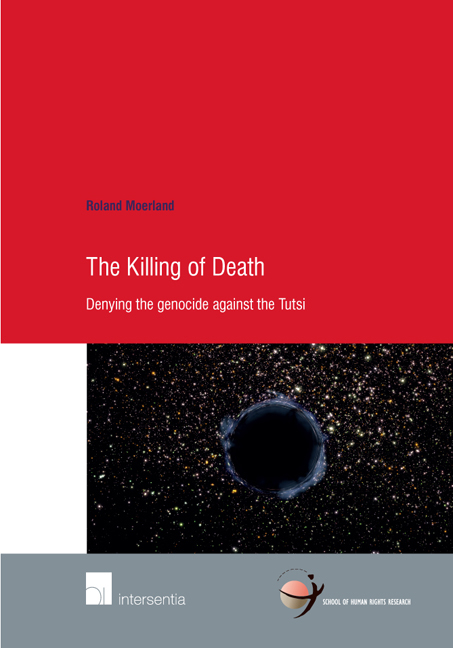Book contents
- Frontmatter
- Dedication
- Preface
- Contents
- List of abbreviations
- Table of figures
- Introduction
- Part I Exploration
- Chapter 2 Genocide and denial
- Chapter 3 Genocide denialism
- Part II Inspection
- Part III Reflection
- Chronological overview of significant interviews, consultations and events
- Selected bibliography
- Curriculum vitae
- School of Human Rights Research Series
Chapter 2 - Genocide and denial
from Part I - Exploration
Published online by Cambridge University Press: 21 September 2018
- Frontmatter
- Dedication
- Preface
- Contents
- List of abbreviations
- Table of figures
- Introduction
- Part I Exploration
- Chapter 2 Genocide and denial
- Chapter 3 Genocide denialism
- Part II Inspection
- Part III Reflection
- Chronological overview of significant interviews, consultations and events
- Selected bibliography
- Curriculum vitae
- School of Human Rights Research Series
Summary
Introduction
In order to address the lack of theoretical grounding discussed earlier and to address the self-explanatory use of the concept of genocide denial, the first part of this study (Chapter 2 and 3) will elaborate on how genocide denial can be more clearly conceptualised and defined so that it can be used for research purposes. This requires first of all an explanation of what the concepts of genocide and denial, which are the main conceptual building blocks, entail and it furthermore requires an explanation of how the two concepts are related. These questions will be the focus of this Chapter.
The complex nature of both phenomena (genocide and denial) has led to lengthy scholarly discussions concerning their delineation. However, due to the fact that the discussion of these two concepts should provide for a better understanding of the phenomenon of genocide denial, the analysis of the two concepts will be limited to a critical discussion of the conceptual dimensions that are relevant in the light of this study. The Chapter will first address the dimensions of the concept of genocide and subsequently address how this concept is related to the concept of denial. Lastly, the relevant dimensions of the concept of denial will be elaborated on.
The discussion of genocide in the next Sections goes back to the roots of the concept and focuses predominantly on how Raphael Lemkin, who developed the concept, understood genocide. Lemkin's original insights concerning genocide are valuable in understanding the role genocide denial plays in the process of genocide. What is particularly insightful about Lemkin's work is that he acknowledged the many ways (techniques) by which genocide can be perpetrated, which is an insight that was severely marginalised in subsequent scholarly conceptualisations of genocide. When discussing the concept of denial, the “opposite” approach is taken and, instead of focusing on the original conceptualisation of denial by Freud, the discussion elaborates how other scholars have contributed to the development of the concept.
- Type
- Chapter
- Information
- The Killing of DeathDenying the genocide against the Tutsi Roland Moerland, pp. 45 - 96Publisher: IntersentiaPrint publication year: 2016

